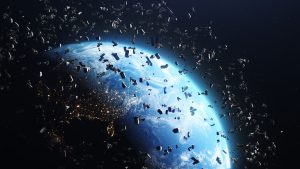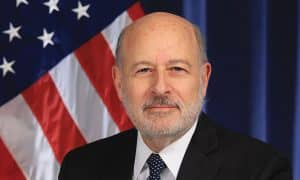Sustainability has been affecting all walks of life. As common knowledge goes, even the space sector needs many corrections when it comes to practices aiding towards a better planet. The services that outer space provides are unmatched when compared to other methods of technology. However, the challenges in-situ are difficult to a level that would need drastic measures.
A panel to discuss the same was held on the 4th day of the Geospatial World Forum 2023. The theme of the session was: Space Sustainability and Threats to Geospatial Assets and Data. The panel was constituted of 3 women and one male member representing different entities.
While talking about the effects, consequences, and the need to deal with space debris, Kees Van Der Pols, Head of Ground Segment and Mission Operations, ClearSpace said, “There are objects that we can see and know where they are. Then there are objects we know exist but we don’t know where they are. And the third category, which is the items and debris that we don’t see but we know problems will arise due from it. Regarding this, one can mitigate by making sure it doesn’t hurt you that much, one can prevent by not putting anything there, one can avoid by making your way around it and you can remove the debris. The latter part is where ClearSpace comes in picture.”
“Dealing with space debris is expensive and difficult. And it will become increasingly difficult to design your way out of this issue. We need not to design against it. This is not a treatment of the consequences,” he added.
The session moderator Krystal Azelton, Director of Space Applications Programs, Secure World Foundation took the stage then to validate Kees’ points and reiterated, “This is something we cannot ignore. It can increase the cost of data, it can delay it. It can be a big problem for continuity of service. So, really understanding the debris problem as a community and then thinking of solutions is really important.”
“One of our current prominent projects being done in partnerships with Secure World Foundation is our Space Security Lexicon. One of the most pressing concerns in the field of space security is that there is no common understanding of the most frequently used terminology and concepts in space security discussions. With this Lexicon we hope to alleviate some of this misunderstanding,” said Sarah Erickson, Research Assistant – Space Security and WMD Programmes, UN Institute for Disarmament Research (UNIDIR).
“Likewise, there is a concern over lack of transparency and understanding of State’s policies and governance measures over space activities. This is why we are creating a space security portal to house both international and national space policies and governance mechanisms as well as global multi-stakeholder initiatives,” she further said.
Dimitra Stefoudi, International Institute of Air and Space Law, Leiden University said, “The issue of sustainability has been discussed and prioritized much more lately. And it has led us to some documents that are necessary law because they are not binding but they are consistently followed by both private actors and states, space agencies and so on.”
“The issue of sustainability is often closely connected with the matter of debris. Of course, if you have growing number of debris in outer space it means we will not be able place more objects and the objects that are already there, are in greater danger. This is why we have debris mitigation guidelines,” she emphasized.









